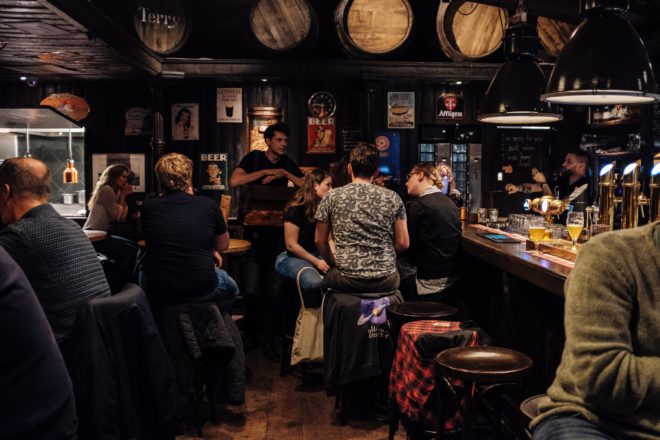Bar Rescue’s Jonathan Taffer on COVID-19 Restaurant Changes

“I have great confidence in the restaurant business. We’ve been dealing with invisible enemies since our inception. We’ve called it bacteria. Bars and restaurants deal with bacteria every day,” says Jonathan Taffer, the host of the television show Bar Rescue which premiered in 2011 and is entering its 12th season with Paramount Network.
Many restaurant owners look to Taffer for advice on how to cope with the challenges of coronavirus. He spoke candidly to this audience in a recent conversation with Barry Ritholtz. “We know how to clean our surfaces. We know how to wash our hands. We know what chemicals to use to clean those services. We know to separate raw product from cooked product. We are really good at this. A good restaurant operator manages bacteria in his kitchen every single day, and people don’t get sick.”
Indeed, the transmission of both bacteria and viruses occurs through a common transport mechanism: respiratory droplets. According to the CDC, bacterial and viral diseases alike are transmitted through respiratory droplets from other people coming in contact with mucous membranes in the eyes, nose, and mouth.
“Now we have a virus,” continues Taffer regarding COVID-19 safety practices in restaurants. “We still have to wipe our surfaces all the time. We still have to wash our hands all the time. Now, we’re adding masks and other PPE to the process, but make no mistake. Unlike the retail business or the car business or the furniture business, restaurants know how to do this. We’ve been doing it our whole lives.”
The CDC has tallied over 2 million cases of COVID-19, including 711 deaths and 22,317 new cases since yesterday. Although the CDC does not know the exact number of deaths caused by flu (which is not a reportable disease in most parts of the country), it estimates 24,000-62,000 flu deaths from the six months starting October 2019 through March 2020. Even at the high end of the CDC’s flu death estimate, current U.S. COVID-19 deaths of 114,625 are at least double the flu death rate. At the low end of the CDC’s flu death estimate, U.S. COVID-19 deaths have quintupled the flu death rate.
Does Taffer believe the restaurant industry will achieve a full recovery by 2022, as forecasted by senior analyst Michael Halen? “Once we have a vaccine and people feel safe, I believe we go back to normal activity,” says Taffer. “I think that there might be some adjustments to society. I think kitchens will never quite be the same. And I’m all for that.”
Taffer also provided his signature advice for improving owner discipline. “I walk in, and within about two or three minutes I can scope the operation,” says Taffer. How long does it take an experienced chef to determine the quality of a dining establishment? “I can determine what operational potential it has literally in minutes. Things like smell, music, pace, energy, the setup behind the bar. How do the tabletops look? Are salt and pepper shakers sticky? Are they clean? I mean, there’s eight or 10 things that you can use as pretty good measurements to determine ability.”
Taffer continued, “But to me, the business isn’t what’s failing, it’s the owner that’s failing. And I’ll always look at taking a look at a bar, and the only way I could fix a failing business, is to fix a failing owner. And every failing business has a failing owner. So I start there. I started on the owner.”
He encouraged owners to embrace sanitation and cleanliness procedures. “I can’t make the owner want to clean. I can’t make the owner embrace change. If I can’t make the owner change his life, day to day processes, his procedures, then I cannot change the business. That’s why Bar Rescue gets so intense.”
He concluded, “I can put into computer systems, the recipes. That’s easy. That’s logistics. The challenge is creating an owner who knows how to be successful, and has the desire to be successful. That’s always the biggest fight in Bar Rescue.”
Photo by Victor Clime on Unsplash

Leave a Reply